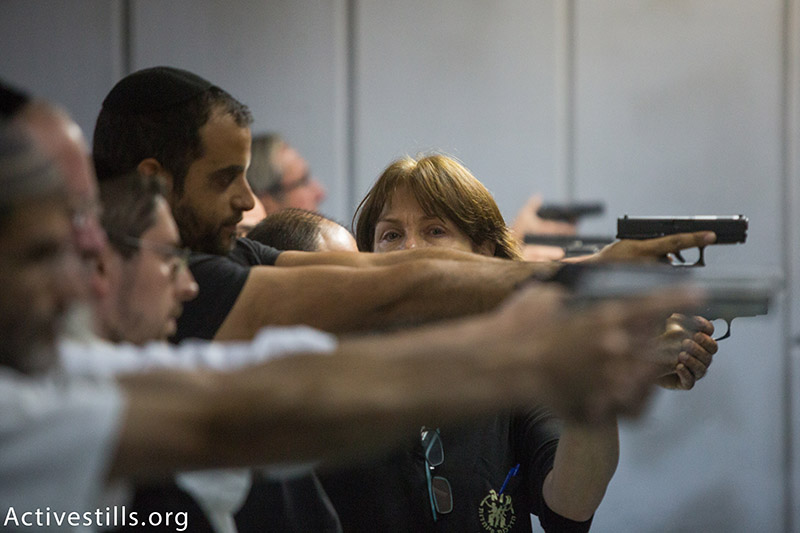In response to the recent wave of violence Israel’s public security minister wants to put more guns in more (men’s) hands and in more homes. The only guaranteed result, however, is that more women will be killed inside their own homes.
By Rela Mazali

Israel’s gun policy is changing as you read this. The country’s gun policy was already dubious at best, but now moving toward catastrophic. The catastrophe will play out over time in multiple “small” tragedies, wrecking multiple “small” lives. In hindsight, once they’ve occurred, all of them will have been predictable and preventable. But, preventable or not, they are being chosen knowingly, adopted as policy.
Israel’s small arms policy in the occupied territories has been catastrophic for years. In the West Bank, security forces and settlers fire at Palestinians and demonstrators as a matter of course, with impunity. This has been the reality for many years and it is doubly so now, in the face of individual attacks by Palestinians and Israel’s stepped-up violence. While still working hard to piece together a fuller account, the activists of Gun Free Kitchen Tables can offer an estimate of the shooting incidents reported by media and human rights groups during October-November 2015. Out of 107 reported incidents, 64 were in the occupied territories. As numerous incidents go unreported, this represents only part of the use of firearms, mostly by soldiers, beyond the Green Line.
Israel’s changing small arms policy both within and beyond the Green Line is hurtling, fast, in the same direction. Before we know it, the Israel inside the line will look like the U.S. Even 43 shooting incidents in two months are a lot (out of a total of 107 reported in October-November). Over three analogous months in 2013 (October-December) police reports cited about 45 such incidents both in Israel and in the occupied territories. In other words, three months at the end of 2013 saw under half the number (just over 40 percent) of shootings reported in two months near the end of 2015.
Small arms policy is a policy of life and death. It determines who is authorized to purchase, hold and operate a tool that unleashes lethal force at the pull of a trigger. It determines where, when and under what circumstances the trigger finger is to be used and what type of oversight gun owners and shooters are subject to. Here, as elsewhere, small arms policy molds culture, behavior, habits and social environment. It constructs a particular consciousness and educates youth. It is also reciprocally formed by all of those same elements.
Recently, the minister in charge of what is dubbed “public security” in Israel has actively encouraged increased and widespread use of firearms. In doing so, he is clearly implanting into “Green Line Israel” the sustained racist gun-use catastrophe that prevails in the occupied territories.
A government urging its citizens to “live by the sword forever,” as Prime Minister Netanyahu did recently, is necessarily left without relevant means for confronting attacks by random individual Palestinians. It has no tools for dealing with unorganized, unpredictable actions approaching what South Africa’s resistance called “ungovernability” in the 1980s.
This means that the policy change being led by the minister of public security is a mere smoke screen. More than that, it is a radical relinquishment by the government of its very legitimacy, of the supposed justification for its existence. Minister Erdan’s current measures amount to a declaration that, “We, as government, are at a loss. So just do it yourself. Arm yourself and protect yourself.” (“You” in this case is distinctly male.) This is a policy change that radicalizes the ongoing process, in Israel, of increasingly privatized security which dissolves government accountability. No national security, no accountable administration, just every – armed – man for himself. The gospel by Erdan places each (man) in his fortress-home, spying outwards through the rifle sights. “Out there” is hostility and constantly suspected attacks. Every apartment, home, office, car, institution become forts and arms caches.

What, in practical terms, has the minister been introducing? A significant expansion of the pool of people eligible for gun licenses based, of course, on their national origin and military training. Eased processes for renewing existing licenses, making renewal all but automatic. Repeated public announcements actively encouraging people to arm themselves, to carry guns at all times and, most of all, to use them Hollywood style: a fast draw and a lethal aim, supposedly riding to the rescue of innocents faced by bad guys. Collateral damage? No problem. As in Westerns, this is men’s business. It is a policy willfully blind to the women in the name of whose protection it hands out firearms wholesale.
Women face specific risks in conditions of accelerated small arms proliferation. Worldwide, and here too, the numbers show that guns in homes and families endanger women far more than they protect them. This should be no surprise. For vast numbers of women, home is not a fortress. It is the space in which they are the most at risk. A machine letting loose lethal force at the pull of a trigger turns this space – the world over – into the only one in which women are over-represented among its victims. In all other spheres, women represent just a small percentage of gun violence victims. In families and homes, small arms endanger them in particular.
Israel’s legislature is about to decide on an amendment to the Firearms Act, proposed and promoted by the minister of public security, as part of his overhaul of small arms policy. The amendment stands to nullify a previous amendment, enacted in 2008, which prohibits private security firms from storing company arms in guards’ homes (Clause 10c).
Though enacted in 2008, the clause remained unenforced until 2013, probably due to cost considerations. In the five-year gap between enactment and enforcement, 18 women and men (mostly women) were killed with the guns belonging to security firms but which were sent home with guards. In the decade-plus between 2002 and 2013, at least 33 innocent people were killed with such guns (18 women and 15 men). The law was finally enforced 33 victims too late, due to the feminist advocacy of the multi-organizational campaign Gun Free Kitchen Tables.
Since its (still partial) enforcement in the summer of 2013, not one case of murder with a security firm gun has occurred in a home or a family. Two-and-a-half years is the longest period without such murders since we started documenting them in 2002. Before that not a year went by with one or more killing with a gun taken home by a security guard.
In an expert gender analysis submitted January 6 by Gun Free Kitchen Tables and signed by 20 women’s organizations and civil society groups, we expressed our strong objection to the proposed amendment. The minister claims it will aid defense against terror while dismissing the need for defense against gender-based terror. Personal security and security as a woman are no less urgent and needed than so-called national security.
It’s even doubtful whether, as the minister claims, sending home the guns of security firms will contribute to protecting the population in any significant way. According to the data collected by Gun Free Kitchen Tables, shootings by security guards were only about 10 percent of all the shootings meant to stop attackers or suspected attackers in the course of October 2015 (6 out of 55 such incidents). Not one of the security guards involved in these shootings was off duty at the time. Though the shots were fired during work shifts, when guards are ostensibly prepared and alert, one-third to one-half of these shootings were moreover mistakes. Two were definitely mistaken (including the shooting that killed asylum seeker Habtom Zerhom) and a third was very likely mistaken.
As a total of 20 women’s groups and civil society organizations wrote the minister of social equality last week: “The proposed amendment is a step backwards in the state’s protection of women and civilians … We appeal to you, as the minister responsible for advancing and implementing gender equality, to act firmly to stop enactment of this amendment given to the grave dangers it poses, mainly for women. We call on you to prevent the gender discrimination and blindness that forfeit women’s security for alleged national security.”
Rela Mazali, a writer, an independent scholar and a feminist activist, is one of the leaders of Gun Free Kitchen Tables. A version of this article was first published in Hebrew on Local Call: read it here.
